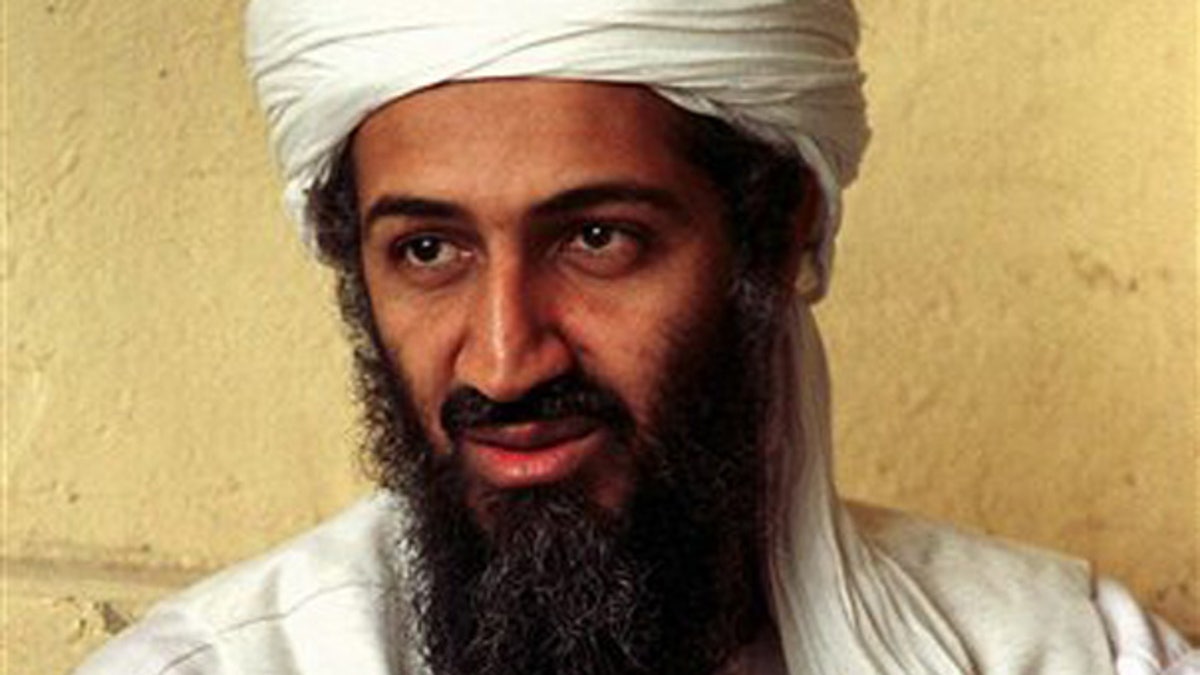
In this April 1998 file photo, exiled Al Qaeda leader Usama bin Laden is seen in Afghanistan. (AP)
Former U.S. Secretary of State James Baker had a great line he used when dodging a reporter’s question, “couldn’t say” he would remark with a broad smile or twinkle in the eye as the situation warranted. Here in Israel, they know a thing or two about assassinating their wanted "terrorists." They are also experts at saying "couldn’t say."
An entire Wikipedia page is dedicated to the details of “Israeli Assassinations” and counts more than 50 dating back a half century. Some of Israeli’s most-wanted were killed covertly: letter bombs, exploding cell phones or poisoned chocolate.
Others were killed by less covert ways that sent a clear signal: missiles fired from helicopters, car bombs and a long Israeli favorite: a few shots to the head in public often as the condemned vacationed far from the Middle East.
Despite their incredible successes, the Israeli prime minister, military units or intelligence agencies rarely, if ever, take a public curtain call after such an operation with media briefings, speeches or visits to the site of their country’s many terrorist attacks.
In retaliation for the Black September attack on Israeli athletes during the 1972 Munich Olympics, Israeli Prime Minister Golda Meir ordered Operation Wrath of God, dispatching Mossad teams around Europe and the Middle East to track down and kill each member of the militant group.
The operation took years, but slowly Black September members died: a bomb exploded under the bed of a Jordanian man when he turned off the lights, some were shot in the street, and others mysteriously died in their hotel rooms. In most cases, the assassins disappeared into the night leaving Israel with substantial plausible deniability.
It was just the beginning of Israeli’s assassination program, which has continued in the streets of European capitals, Middle Eastern cities and the back alleys of the Palestinian territories.
One thing has remained constant: The Israeli governments official response to reporters’ questions is the basic equivalent of "couldn’t say" with a broad smile.
Even when caught virtually red-handed in the murder of a Hamas arms buyer in Dubai, spokesmen and even trusted sources within the Jewish state’s security apparatus remarked that they just "couldn’t say" who was involved. They noted that bad things tend to happen to bad people and it was just "tragic" that events transpired the way they did.
Here in the Middle East it’s almost weekly that a Hamas operative dies under unconfirmed yet rather obvious circumstances; even considering the censorship restrictions on the Hebrew media, there is precious little coverage of Israel's anti-terrorism successes.
The Jewish state instead relies on folklore and the terrorist grapevine to spread the word of what many in the intelligence community refer to as "wet work." And, in many ways, they have been hugely successful; often times instilling such paranoia into militant groups and its leadership that they become far less effective.
No one here, especially those in the Israeli Military/Intelligence community, seems to have shed a tear about Usama bin Laden’s death. In fact, many have expressed their quiet and sincere admiration for the daring SEAL operatives, helicopter pilots and CIA agents. But -- and it’s a big "but" -- there is a genuine shock at the celebrations that overtook the United States in the hours after President Obama’s Sunday night television address.
A number of people here have been even more stunned by the media coverage fueled by intensive speculation and administration leaks that to some experts severely compromise operational security. Details of a similar Israeli operation would take years to leak and even decades later are not officially confirmed. It was the United States that confirmed the story of the 2007 Israeli mission that destroyed Syria’s nuclear facility.
It is hard to tell if the Israelis have adopted this humble line to deflect world condemnation (unlikely since it happens anyway) or because, despite their occasional PR disasters, the Israeli government seems keenly aware that one man’s terrorist is another’s freedom fighter.
The pragmatism of that realization means the gloating over anti-terror missions would be far greater inspiration for future militants than the words of any imam in the madrahs of the Middle East. The incredible success of last weekend’s mission is a huge, clearly defining moment in the war on terror and one that experts say could cause Al Qaeda to unravel.
It also sends an important message, as President Obama now famously said, this mission and the overwhelming publicity about it means that those seeking to follow in bin Laden’s murderous footsteps will know that “when we say ‘we never forget,’ we mean it.”
That said, no one, especially enemies of the Jewish state, has ever questioned its long memory and only time will tell which policy, that of public celebration or quietly saying "couldn’t say" will best serve the long-term goals of the two countries in the world most affected and threatened by Islamic terror groups.
